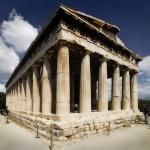|
This section contains 340 words (approx. 2 pages at 300 words per page) |

|
c. 370 B.C.E.–c. 304 B.C.E.
Philosopher
Music theorist
Most Important Figure in Music Theory.
Known in antiquity as o mousikos ("the Musician"), Aristoxenus was born in Calabria, at Tarentum, Italy, around 370 B.C.E., and died in Athens around 304 B.C.E. He was the son of Mnesias, a musician from Tarentum, and studied music first with his father, and later with Lamprus of Erythrai in Mantineia, and the Pythagorean philosopher Xenophilus of Chalkis. Finally, he came to the Lyceum in Athens, and became a star pupil of Aristotle. According to the Byzantine lexicographer Suda, Aristoxenus was expecting to be named Aristotle's successor at the Lyceum, and was angry when his colleague Theophrastus was chosen instead. A prolific writer, Aristoxenus was said to have produced 453 essays and books on music, philosophy, history, and education. Unfortunately, nearly all of his works are lost, though some useful...
|
This section contains 340 words (approx. 2 pages at 300 words per page) |

|




